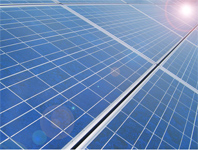
| ||
Making sense of renewable energy in IsraelBy:
Daniel Gold
While Israel is a world leader in solar water heater
implementation, as well as in developing new technologies that are
commercialized worldwide, Israel is still quite a long way behind countries such
as Germany, Spain and the US etc, in terms of implementation of photovoltaic
technology.
The capacity of energy systems (wind, solar, coal, nuclear, etc..) is measures in watts, which is essentially telling you the rate of power production. You can understand this number by looking the wattage rating of everyday household appliances. For example, a standard light bulb uses 60watts of electricity continuously to keep it running. An energy efficient bulb uses around 20watts.. The energy produced is measured in kilowatt-hours. A 100 watt light bulb running for 10 hours uses 1000 watt-hours, or 1 kilowatt hour. These are the 'parcels' which you buy and sell electricity in - so you want your system to produce as many kilowatt hours as possible over the course of a year..  To run ten 100 watt light bulbs at the same time, you will need a 1000 watt system, in other words a 1kW system. Neither solar energy, nor wind energy systems will produce energy continuously. Therefore, the way around this problem is to connect the system to the electricity grid, so that when there is not enough energy being produced, you draw what you need from the electric company, when a surplus is produced, it gets sent to the electric company. Modern systems are installed with an extra meter so that the electric company can count your incoming and outgoing electricity, and pay you for everything you produce.. Because these systems do not produce electricity continuously, your aim should not be a system that produces as much as you require at some times, because there will often be a mismatch between what you require and what is being produced. Instead, you should choose a system that produces at least enough revenue from selling the electricity to the Israel Electric Company, to cover your electricity bill.. The amount you will need to invest is approximately 100,000 NIS for 4kW a residential system and up to 800-900,000 NIS for a 50kW commercial system. The prices depend on the technology used, the quality of the equipment and the installation. As with anything, it is worth paying a bit more for better quality as these systems will be installed potentially for decades.. Now is the perfect time to be looking into buying one of these systems, while the government is providing generous incentives - and these won't last for long! About the Author: |
||



